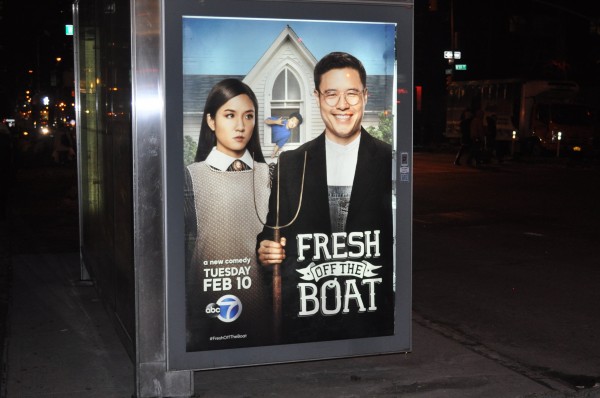The American Dream: Chopsticks or Forks?
February 26, 2015
Based on the memoir of chef and writer Eddie Huang, ABC’s “Fresh off the Boat” proudly proclaims that it’s a show where, yes, Asian people are the main characters.
In an effort to get his restaurant off the ground, the dad relocates the family from Washington, D.C. to Orlando, Fla. The struggles the family faces in this significantly whiter community revolve around the viewpoint of the 11-year-old son, Eddie, who is both the narrator and the main character. Here, we’re talking about a chubby kid who’s repping Biggie and Nas on his shirt. In his first lines, he says, “If you’re an outsider, hip hop is your anthem—and I was definitely the black sheep in my family.” You quickly get the sense that Eddie is “mature beyond his years.”
Before any lines were even spoken, I was surprised by the feeling I got seeing familiar faces on screen. When I say familiar, I mean faces with recognizably Asian features. That, in and of itself, showed me how accustomed I’ve grown to the lack of Asian representation in mainstream media.
The title of the show has been controversial: “fresh off the boat” (FOB) was and still is used as a derogatory term to describe Asians, as well as other immigrants who have just come to America.
As an American-born Chinese (I wonder if ABC knows it has another acronym), in my mind the term “FOB” conjures up a picture of someone who evidently has not “assimilated” into American culture. To be more specific, I would use “FOB” to describe Asian kids who only seem to hang out with other Asian kids, who look “super-nerdy,” or have 25 keychains hanging off their Chanel bag. I’m speaking for myself when I say I have used the term in this way to label and judge people, in order to differentiate myself from them.
In grade school, I thought it was funny to call myself a “banana,”—to say that I’m yellow on the outside, but white on the inside. Disturbing? Yes, but not as hurtful as when (non-Asian) people use “chinky” to make fun of their eyes in photos. These words most likely won’t go away. Can we all better use, or even avoid using these words so as to avoid perpetuating racial stereotypes? Certainly. I’m excited to see how the show will continue to represent “fresh off the boat,” keeping in mind that it’s only a representation.
Notably, Eddie says the Huangs are an “American family,” not a Taiwanese-American family.
Much of the concern and criticism directed at the show has to do with whether the show will represent Asian culture or if will it be an Americanized version.
Of this, I believe the generation gap does a great job in illustrating that it’s not about choosing between a pair of chopsticks and a fork. Oftentimes Eddie’s mother, a stereotypical “Asian mom” who doesn’t buy into white culture, and Eddie, who actively tries to shed his Asian identity, struggle to meet in the middle. We can’t forget that the show also portrays what it was like growing up as an Asian kid in a white community. In one episode, Eddie throws out his homemade lunch because other kids were repulsed by something they’d never seen before. Several people I know, myself included, have experienced similarly traumatizing incidents; in having to feel ashamed of the food we ate because it looked weird or smelled bad to other people.
As this is the first Asian American family sitcom to appear on network television in 20 years, the network can stop worrying about how to market a show featuring Asian people as the main cast to white people. It will only serve to undermine the show itself, which definitely has a lot of content to work with. Furthermore, members of the Asian community will need to be mindful of their expectations for the show to “justice” for Asian people, because we already know that this means different things for different people. The success of the show, for me, will come with actively challenging its own mixed cultural associations.










